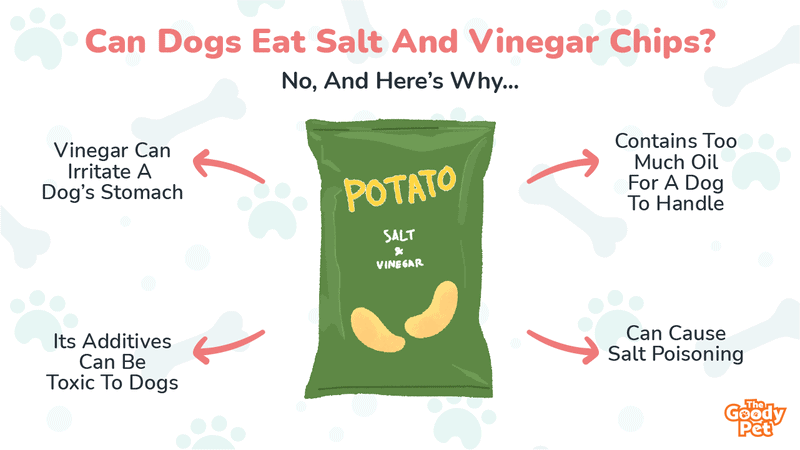Tasty, crispy, and loaded with flavor dogs love, salt and vinegar chips have everything dogs crave. However, most dog owners may not know whether salt and vinegar chips make a healthy treat for their four-legged furry friends. So, can dogs eat salt and vinegar chips?
Unfortunately, dogs can’t eat salt and vinegar chips, even though such chips are a hot favorite among humans. High levels of vinegar and salt can cause gastrointestinal upsets due to vinegar’s low pH level and extreme thirst in dogs. So, it’s best to avoid giving salt and vinegar chips to your pup.
Salt and vinegar chips are undoubtedly delicious. But they’re not an appropriate selection for Fidos. In fact, much about this renowned snack makes it a no-no for our adorable furry companions.
This article covers the ins and outs of feeding dogs salt and vinegar chips. We’ll cover everything from how to treat salt poisoning to similar snacks to avoid giving your doggie. Before we do, let’s review the reasons salt and vinegar chips are bad for dogs.
Can Dogs Eat Salt And Vinegar Chips In Moderation?

No, dogs can’t eat salt and vinegar chips, even in moderation. Salt and vinegar cause digestion issues in dogs, even in moderate amounts, so avoid giving them to your pup altogether.
Both salt and vinegar pose health risks and can cause issues for dogs. When combined, expect even worse consequences. Although dogs can eat a wide variety of food, canines have sensitive stomachs.
Yes, these furry friends can develop issues with foods humans safely eat. A classic example is salt and vinegar chips.
If they eat what would be considered a small amount of salt and vinegar chips for a human, dogs can experience vomiting, diarrhea, and dehydration. So, it’s best not to take any chances with this snack.
Why Should Dogs Not Eat Salt And Vinegar Chips?
Dogs should not eat salt and vinegar chips because their bodies can’t handle them. Salt can cause salt poisoning when taken in excess, while vinegar can irritate the dogs’ stomachs, especially when concentrated.
Before we proceed, it’s best we first understand the individual ingredients in salt and vinegar chips:
- Additives
- Oil
- Potatoes
- Salt
- Vinegar
Potatoes aren’t bad for dogs. Potatoes are, in fact, rich in potassium, vitamin C, fiber, and nutrients dogs need. However, the other ingredients in salt and vinegar chips aren’t as harmless. Let’s take a closer look at each.
Additives
Additives in salt and vinegar chips, such as flavorings and preservatives, are not good for dogs either. Additives can cause stomach upset and other health issues in dogs.
Oil
While a small amount of oil is not harmful to dogs, too much oil can cause digestive issues. Unfortunately, salt and vinegar chips usually contain a great deal of oil, so they are likely to upset a dog’s stomach.
Oil can also lead to weight gain in dogs. And when dogs become obese, they become prone to other health problems such as joint pain, respiratory difficulties, heart conditions, and diabetes.
Salt
The high salt level in salt and vinegar chips is the reason dogs can’t eat them. When dogs consume too much salt, they develop salt poisoning. Salt poisoning happens when the high levels of salt in their diet cause an imbalance in their body’s electrolytes.
Symptoms of salt poisoning include:
- Diarrhea
- Excessive thirst
- Frequent urination
- Lethargy
- Muscle weakness
- Vomiting
Salt poisoning can cause seizures, comas, and even death in severe cases.
Vinegar
While it may not be as dangerous as salt, vinegar can still irritate a dog’s stomach.
Dogs have a very low tolerance for acidic food. So, when consumed in large or undiluted amounts, vinegar can cause stomach upset and irritation in dogs. Additionally, the level of acidity in vinegar can also damage a dog’s tooth enamel.
So, in other words, most of what goes into salt and vinegar chips is not considered healthy for dogs. That’s why it’s best to keep them away from your furry friend.
Can I Give My Dog Salt Chips?
No, you should not give your dog salt chips. Like salt and vinegar chips, high levels of salt present in these chips can cause issues like salt poisoning in dogs. So again, keep salt chips away from your pup.
As stated, excess salt isn’t healthy for your dog. Never give your furry friend excessive salt, no matter what. A small amount of salt won’t harm your dog. But too much salt can cause salt poisoning in dogs. Unfortunately, the amount of salt in these chips is too high for dogs to handle.
Again, it’s worth pointing out that what may appear a small amount to you could be a lot for your pup. So, to be on the safe side, it’s best not to give your dog any salty treats. Even though you may be tempted to share your bag of salt chips with your furry friend, resist the urge. Your dog will be better off.
What Do I Do If My Dog Eats Salt And Vinegar Chips?

If your dog eats salt and vinegar chips, the necessary response depends on the amount eaten. If the amount is large, call your veterinarian right away. Otherwise, watch your dog to see how they respond.
But again, if your dog has underlying problems that make them more susceptible to salt poisoning, we recommend calling your vet even if it only ate a small amount of salt and vinegar chips.
Also, if you aren’t sure of the number of chips your dog ate, it’s best to call your vet. Keep in mind when it comes to your pup’s safety, it’s always best to operate on the side of caution. That way, you’ll avoid any complications.
The consequences of salt and vinegar chips are the side effects of the individual ingredients in the chips.
How Do You Treat Salt Poisoning In Dogs?
Unfortunately, there isn’t a treatment for salt poisoning. However, the affected dog will be admitted for IV fluid therapy, oxygen, electrolytes, and close monitoring in most cases. It may take days for the salt levels in their system to return to normal.
When a dog eats food containing sodium, the vet has to find a way to slowly bring your pup’s sodium level back to normal. This is done by giving them IV fluids and electrolytes. The vet will then monitor your dog closely until the sodium level returns to normal.
Any sudden change in sodium level can increase the chances of issues such as heart attack, cerebral edema, and swelling of the brain. That’s why the vet has to make the process of returning the sodium level to normal a slow one.
Is Vinegar Pet Friendly?
Whether vinegar is pet-friendly depends on a few factors. While undiluted vinegar is acidic and can irritate a dog’s skin, diluted vinegar is usually safe. In fact, vinegar can treat a variety of issues affecting dogs.
When talking about the versatility of household products, vinegar is one product that comes to our mind. Whether you are cooking, neutralizing smells, cleaning, or deterring bugs, vinegar is always useful.
That’s perhaps one reason vinegar has become one of the most popular products in homes. However, it may leave dog owners wondering whether it’s safe for their furry friends.
Yes, vinegar is beneficial for your dog, especially when diluted and in small amounts. Most pet parents are already using this inexpensive pantry staple to benefit their dog’s health.
Vinegar, especially the unfiltered apple cider variety, is rich in magnesium, iron, and potassium, minerals your dog needs for their health. Vinegar also addresses digestion issues and helps break down fats and proteins.
If you are thinking of giving your dog some vinegar, go ahead. A small amount will benefit them. Sprinkling a small amount over your pet’s dinner is one clever way to administer it.
Alternatively, add one teaspoon of vinegar to your dog’s water bowl. That will allow your dog to reap the benefits of this product without consuming it directly from the spoon.
But again, it’s worth pointing out that vinegar isn’t entirely safe for dogs. Like any other household product, there is a possibility that your pet might be allergic. So, start with a small dose before increasing it.
Again, some dogs shouldn’t ingest vinegar in any amount. That’s especially true for young pups with gastrointestinal issues because vinegar can exacerbate the condition.
Always ensure to offer diluted vinegar to dogs. The undiluted variety can be too acidic and might irritate your pet’s skin and gastrointestinal tract. Undiluted vinegar also kills good bacteria in the gut, which might cause digestive issues.
Does Vinegar Help Dogs’ Itching?

Yes, apple cider vinegar can help with dogs’ itching. Diluting vinegar and water at equal ratios and spraying it on canines with itchy skin can help alleviate the problem.
Vinegar changes the pH of a dog’s skin, making it harder for yeast to grow. It also helps restore the good bacteria that harsh chemicals in some dog shampoos and conditioners might have killed.
When using vinegar to alleviate your pet’s itchy skin, always ensure that you don’t use it in its undiluted form. As previously stated, undiluted vinegar is too acidic and further irritates a dog’s skin.





